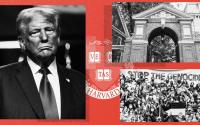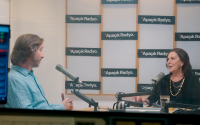12 October 2008Thomas L. Friedman
My friend Rob Watson, the head of EcoTech International, has a saying about Mother Nature that goes like this: "Mother Nature is just chemistry, biology and physics. That's all she is." And because of that, says Rob, you cannot spin Mother Nature. You cannot bribe Mother Nature. You cannot sweet talk her, and you cannot ignore her.
She's going to do with the climate whatever chemistry, biology and physics dictate. And Mother Nature always bats last, and she always bats a thousand.
There is a parallel with markets. At their core, markets are propelled by fear and greed. They're just the balance at any given moment of those two impulses. Over the long run, you cannot spin the market. You cannot sweet talk it into going up or beg it not to go down. It's going to do whatever it's going to do - whichever way greed and fear tug it. And the market always bats last and it always bats a thousand.
What am I saying? We are where we are today because we went on a credit binge and we're now paying the price. Because it was the biggest credit binge the world has ever been on, a lot of wealth is going to be wiped out. Now what you're witnessing is the market re-evaluating and re-pricing every asset in the world, without mercy, telling each stock, bond and bank what its value is in a post-credit binge world.
So why, despite the congressional bailout, haven't banks started lending again?
You have to go back to the beginning of the problem. After the fall of the Berlin Wall, virtually every economy in the world moved to a capitalist system, which eventually made the world awash with money looking for investments. It didn't take long for financial engineers to figure out how to move home mortgages and commercial loans from a transaction between you and your local bank - or between your company and a syndicate of banks - to something much more diffused and fragmented. While your bank may have initiated the mortgage or the corporate loan, it was quickly sold to an aggregator who turned these different loans into bonds and then sold them all over the world in small pieces to banks and money market and pension funds.
The good news about this democratization of finance is that it powered enormous growth around the world. More people than ever grew out of poverty faster - or got rich faster. But the process became so lucrative that people - imbeciles - who should not have been selling these things got into the food chain of selling them. Banks and insurance companies that should not have even nibbled on them, gorged on them. And companies that should not have been dependent on raising capital through them became dependent.
So when some of these loans inevitably turned bad, the whole financial system got infected. Eventually everyone stopped lending to everyone else because no one knew what the other bank's assets were worth. Indeed, if all the banks were really honest about the value of these toxic assets on their balance sheets, many of them would be under water.
The whole story of the last few months has been about different government plans to get the banks lending again. But the market is not waiting. It just keeps saying to the big banks and insurance companies: "We think you're carrying a lot of junk on your books, and if you don't mark it all the way down and re-price it to what it is really worth today, we will re-price you - fairly or not." The market is going to do what it is going to do.
So what could ease this crisis? "There is going to have to be a workout," said the financial strategist David Smick, author of "The World Is Curved," a book about the hidden dangers in today's global economy. "There will have to be a restructuring of all these institutions to clean up their balance sheets and recapitalize them." Banks and insurance companies will have to be reconstituted, merged or left to die, until these toxic assets are properly priced and off the books.
The government's job - which it is still trying to figure out exactly how to do - will be to provide a safety net of guarantees for the surviving banks, so they will be honest about pricing their assets, and then, once they have been, to help recapitalize them.
"Government's other job," added Smick, "is to quickly establish the new rules of the road for truth-in-lending on a global basis. We still need these kind of lending facilities if the economy is going to grow again."
This workout promises to be painful, complicated and protracted.
Government will have to do its part. But it must regulate the excesses without smothering the underlying innovative, entrepreneurial and risk-taking attributes of our economy, which are what will ultimately bail us out - as they always have.
"I have no idea what the stock market is going to do next month or six months from now," Warren Buffett told CNBC on Friday. "I do know that the American economy, over a period of time, will do very well, and people who own a piece of it will do well."
http://www.iht.com/articles/2008/10/12/opinion/edfriedman.php?page=2






